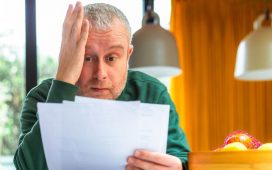Pixelfit | E+ | Getty Images
Falling behind on federal student loans is likely to trigger other major financial consequences for borrowers, according to new research by The Pew Charitable Trusts.
More than 80% of borrowers who experienced default stated that they’d faced at least one additional consequence as a result. The most common impact was a drop in their credit score (62%) followed by being subject to collection fees (47%) and losing eligibility for future federal financial aid (37%).
Other consequences that followed from a default on federal student loans included wage garnishment, the suspension of professional licenses and having Social Security or tax refunds offset.
(The research organization NORC at the University of Chicago conducted an online survey on behalf of Pew in the summer of 2021 studying borrowers’ experiences, focusing on those who had defaulted on a federal student loan. The sample included 1,609 respondents.)
More from Personal Finance:
White House making change to student loan repayment
Retirees’ Medicare expenses could top $383,000 per couple
Entrepreneur built $3 million business buying cars at auctions
“Low credit scores can make it harder to get other kinds of credit that are important to borrowers’ financial lives, like home loans, car loans and credit cards,” said Phillip Oliff, director of Pew’s student loan research project. “Despite these penalties, rates of default and redefault are alarmingly high.”
Most recently, U.S. Department of Education Undersecretary James Kvaal said that if the government isn’t allowed to carry out its sweeping student loan forgiveness plan, there could be a “historically large increase in the amount of federal student loan delinquency and defaults as a result of the Covid-19 pandemic.”
Many unaware of consequences of default
The Pew survey found that many borrowers aren’t aware of specific consequences of defaulting on their federal student loan debt. A third or less of respondents knew, for example, about the possibility of collection fees or wage garnishment prior to falling behind.
“The consequences of default are not just punitive but also intended to recover the funds for the federal government,” said higher education expert Mark Kantrowitz.
In addition to the financial setbacks, respondents reported “a high emotional toll” connected to experiencing the consequences of default “with themes of sadness, depression and anger.”

A borrower is typically considered to be in default when they’ve been past due on their debt between 270 days and 360 days.
Federal student loan payments have been on pause since March 2020, when the coronavirus pandemic first hit the U.S. and crippled the economy. They’re scheduled to resume 60 days after the legal troubles over the Biden administration’s student loan forgiveness plan resolve, or by the end of August, whichever comes sooner.
Collection activity on the debt remains on pause as long as the bills do.
Defaulted borrowers get a ‘fresh start’
Fortunately, the U.S. Department of Education is also providing federal student loan borrowers who’ve fallen behind on their debt a chance to get into current standing.
As part of its “Fresh Start” initiative, the 7.5 million student loan borrowers who are in default are able to return to repayment without a past-due balance. The program was announced last spring.
Once it officially launches, borrowers will start by choosing a repayment plan at MyEdDebt.Ed.Gov or by calling the Education Department’s Default Resolution Group at 800-621-3115, Kantrowitz said.
Your loans should then be transferred from the Default Resolution Group, which is run by Maximus, to a new servicer.
After you’ve been matched with a new servicer and are enrolled in a payment plan, the default should be automatically cleared from your record, Kantrowitz said.
The opportunity is temporary, however. Borrowers will have a one-year window to switch into a new repayment plan and to start making payments when the Covid suspension of bills concludes, which could be as early as May. Take action as soon as you’re able, Kantrowitz added, “to avoid the last-minute rush.”








